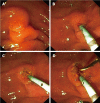Failed biliary cannulation: clinical and technical outcomes after tertiary referral endoscopic retrograde cholangiopancreatography
- PMID: 22174549
- PMCID: PMC3236589
- DOI: 10.3748/wjg.v17.i45.4993
Failed biliary cannulation: clinical and technical outcomes after tertiary referral endoscopic retrograde cholangiopancreatography
Abstract
Aim: Prospective evaluation of repeat endoscopic retrograde cholangiopancreatography (ERCP) for failed Schutz grade 1 biliary cannulation in a high-volume center.
Methods: Prospective intention-to-treat analysis of patients referred for biliary cannulation following recent unsuccessful ERCP.
Results: Fifty-one patients (35 female; mean age: 62.5 years; age range: 40-87 years) with previous failed biliary cannulation were referred for repeat ERCP. The indication for ERCP was primarily choledocholithiasis (45%) or pancreatic malignancy (18%). Successful biliary cannulation was 100%. The precut needle knife sphincterotomy (NKS) rate was 27.4%. Complications occurred in 3.9% (post-ERCP pancreatitis). An identifiable reason for initial unsuccessful biliary cannulation was present in 55% of cases. Compared to a cohort of 940 naïve papilla patients (female 61%; mean age: 59.9 years; age range: 18-94 years) who required sphincterotomy over the same time period, there was no statistical difference in the cannulation success rate (100% vs 98%) or post-ERCP pancreatitis (3.1% vs 3.9%). Precut NKS use was more frequent (27.4% vs 12.7%) (P = 0.017).
Conclusion: Referral to a high-volume center following unsuccessful ERCP is associated with high technical success, with a favorable complication rate, compared to routine ERCP procedures.
Keywords: Biliary cannulation; Failed biliary cannulation; Failed endoscopic retrograde cholangiopancreatography; Needle knife sphincterotomy; Post endoscopic retrograde cholangiopancreatography pancreatitis; Precut sphincterotomy; Tertiary referral endoscopic retrograde cholangiopancreatography; Unsuccessful biliary cannulation.
Figures

Similar articles
-
Precut Over a Pancreatic Duct Stent Versus Transpancreatic Precut Sphincterotomy for Difficult Biliary Cannulation in Endoscopic Retrograde Cholangiopancreatography: A Retrospective Cohort Study.Dig Dis Sci. 2024 Oct;69(10):3962-3969. doi: 10.1007/s10620-024-08603-6. Epub 2024 Aug 31. Dig Dis Sci. 2024. PMID: 39215869 Free PMC article.
-
Pancreatic sphincterotomy versus needle knife precut in difficult biliary cannulation.Surg Endosc. 2009 Apr;23(4):745-9. doi: 10.1007/s00464-008-0056-0. Epub 2008 Jul 23. Surg Endosc. 2009. PMID: 18649101
-
Papillary cannulation and sphincterotomy techniques at ERCP: European Society of Gastrointestinal Endoscopy (ESGE) Clinical Guideline.Endoscopy. 2016 Jul;48(7):657-83. doi: 10.1055/s-0042-108641. Epub 2016 Jun 14. Endoscopy. 2016. PMID: 27299638
-
Difficult biliary cannulation during ERCP: how to facilitate biliary access and minimize the risk of post-ERCP pancreatitis.Dig Liver Dis. 2011 Aug;43(8):596-603. doi: 10.1016/j.dld.2011.01.019. Epub 2011 Mar 4. Dig Liver Dis. 2011. PMID: 21377432 Review.
-
Selective biliary cannulation techniques for endoscopic retrograde cholangiopancreatography procedures and prevention of post- endoscopic retrograde cholangiopancreatography pancreatitis.Expert Rev Gastroenterol Hepatol. 2016 Jun;10(6):709-22. doi: 10.1586/17474124.2016.1143774. Epub 2016 Feb 6. Expert Rev Gastroenterol Hepatol. 2016. PMID: 26782710 Review.
Cited by
-
Palliative management for malignant biliary obstruction and gastric outlet obstruction from pancreatic cancer.Ann Gastroenterol Surg. 2024 Dec 26;9(2):218-225. doi: 10.1002/ags3.12902. eCollection 2025 Mar. Ann Gastroenterol Surg. 2024. PMID: 40046529 Free PMC article. Review.
-
Intractable Biliary Candidiasis in Patients with Obstructive Jaundice and Regional Malignancy: A Retrospective Case Series.Clin Exp Gastroenterol. 2021 Mar 4;14:83-89. doi: 10.2147/CEG.S301340. eCollection 2021. Clin Exp Gastroenterol. 2021. PMID: 33707962 Free PMC article.
-
ERCP PERFORMANCE IN A TERTIARY BRAZILIAN CENTER: FOCUS ON NEW RISK FACTORS, COMPLICATIONS AND QUALITY INDICATORS.Arq Bras Cir Dig. 2018 Jun 21;31(1):e1348. doi: 10.1590/0102-672020180001e1348. Arq Bras Cir Dig. 2018. PMID: 29947682 Free PMC article.
-
Predictive factors of difficult biliary cannulation: An experience of a tunisian tertiary center.Heliyon. 2022 Dec 22;8(12):e12526. doi: 10.1016/j.heliyon.2022.e12526. eCollection 2022 Dec. Heliyon. 2022. PMID: 36619425 Free PMC article.
-
A Multidisciplinary Approach to Pancreas Cancer in 2016: A Review.Am J Gastroenterol. 2017 Apr;112(4):537-554. doi: 10.1038/ajg.2016.610. Epub 2017 Jan 31. Am J Gastroenterol. 2017. PMID: 28139655 Free PMC article. Review.
References
-
- Williams EJ, Taylor S, Fairclough P, Hamlyn A, Logan RF, Martin D, Riley SA, Veitch P, Wilkinson M, Williamson PJ, et al. Are we meeting the standards set for endoscopy? Results of a large-scale prospective survey of endoscopic retrograde cholangio-pancreatograph practice. Gut. 2007;56:821–829. - PMC - PubMed
-
- Baron TH, Petersen BT, Mergener K, Chak A, Cohen J, Deal SE, Hoffman B, Jacobson BC, Petrini JL, Safdi MA, et al. Quality indicators for endoscopic retrograde cholangiopancreatography. Gastrointest Endosc. 2006;63:S29–S34. - PubMed
-
- Schlup MM, Williams SM, Barbezat GO. ERCP: a review of technical competency and workload in a small unit. Gastrointest Endosc. 1997;46:48–52. - PubMed
-
- Loperfido S, Angelini G, Benedetti G, Chilovi F, Costan F, De Berardinis F, De Bernardin M, Ederle A, Fina P, Fratton A. Major early complications from diagnostic and therapeutic ERCP: a prospective multicenter study. Gastrointest Endosc. 1998;48:1–10. - PubMed
-
- Kaffes AJ, Bourke MJ, Ding S, Alrubaie A, Kwan V, Williams SJ. A prospective, randomized, placebo-controlled trial of transdermal glyceryl trinitrate in ERCP: effects on technical success and post-ERCP pancreatitis. Gastrointest Endosc. 2006;64:351–357. - PubMed
MeSH terms
LinkOut - more resources
Full Text Sources

